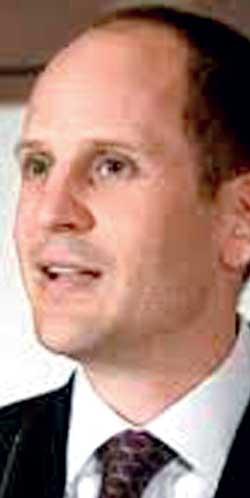03 Oct 2023 - {{hitsCtrl.values.hits}}
In view of the National Day for Truth and Reconciliation in Canada, which falls on September 30, each year, Canadian High Commissioner Eric Walsh took questions from Daily Mirror on the selected topic and related matters relevant to Sri Lanka. It is a day on which Canadians recognise the legacy of Residential Schools and the painful, ongoing impact they have had on generations of First Nations, Inuit and Métis peoples. It is a day to honour both the Survivors and the many children lost forever.
In Canada’s experience, the success of a truth-seeking mechanism relies on its independence from political interests
Minister Anandasangaree’s appointment to the Canadian Cabinet as the first Sri Lankan Tamil fits well into the criterion
The longstanding ties between Canada and Sri Lanka now include exceptionally close people-to-people ties. In particular, the number of people from this country who work, study, or make their home in Canada continues to grow.
 Q: Based on Canadian experience, how challenging is it to establish truth and reconciliation?
Q: Based on Canadian experience, how challenging is it to establish truth and reconciliation?
Let me start by saying that Canada is committed to supporting Indigenous Peoples and Communities as they respond to and continue to heal from intergenerational trauma and the ongoing impact of residential schools.
Residential schools were a shameful part of colonial policies. Some 150,000 Indigenous children were removed from their communities, their families, languages and cultures to attend residential schools.
Many children never returned home, and these are truths that First Nations, Inuit and Métis communities have lived with for many generations.
While most of the 140 federally-run residential schools ceased to operate by the mid-1970s, the last one closed in 1998.
Everyone in Canada has a role to play in learning about and addressing the ongoing impacts of residential schools and of the many children who never returned home.
In 1996, the final Report of the Royal Commission on Aboriginal Peoples was released. It recommended a public investigation into the violence and abuses at residential schools and brought these experiences to national attention.
Nearly ten years later, in May 2006, the Indian Residential School Settlement Agreement was established between Survivors, the Government of Canada, the Assembly of First Nations and Inuit representatives, and the church bodies that had run residential schools. The implementation of the Settlement Agreement began in September 2007 to bring a fair and lasting resolution to the legacy of the residential schools including the establishment of the Truth and Reconciliation Commission.
In its landmark 2015 Final Report, the Truth and Reconciliation Commission issued 94 Calls to Action to mobilise all levels of government, organisations and individuals to make concrete changes in society. The Government of Canada accepted this Report and committed to taking concrete action to advance meaningful reconciliation, including implementing the Calls to Action. This included establishing a National Day for Truth and Reconciliation, which is now marked every year on September 30.
Addressing the harms suffered by Survivors, their families and communities is at the heart of reconciliation and is essential to renewing and building relationships with Indigenous Peoples, governments, and all Canadians.
Canada supports Indigenous-led, Survivor-centric initiatives to help Indigenous communities respond to and try to heal from the ongoing impacts of residential schools.
The National Centre for Truth and Reconciliation, established to house the archives of the Truth and Reconciliation Commission, receives funding from the Government of Canada for its work. This includes collecting, reviewing, and making accessible residential school records, and supporting community-led efforts to locate and identify unmarked burial sites. The funding supports numerous initiatives including the National Residential School Student Death Register, the online National Cemetery Register, and the National Advisory Committee on Missing Children and Unmarked Burials.
Canada is also working directly with communities to support their plans to locate and commemorate children who attended residential schools. Indigenous communities across the country receive support for research, knowledge gathering, commemoration, memorialisation, and fieldwork investigation around the sites of former residential schools.
Reconciliation work is a vital and meaningful process, and it continues.
 Q:What does Canada do to heal the minds of people affected by those incidents?
Q:What does Canada do to heal the minds of people affected by those incidents?
Canada is committed to supporting Survivors, families, and communities to address the intergenerational legacy of the residential school system. An important part of this process is working closely with former students, their families, and communities in support of projects that promote healing.
One of our federal ministries, Indigenous Services Canada, provides cultural and emotional support and mental health counselling through the Indian Residential Schools Resolution Health Support Programme. This continues to support former students in crisis by funding the National Indian Residential School Crisis Line, a 24-hour toll-free support service operated by trained crisis counsellors, many of whom are themselves Indigenous.
Q: What action have been taken to punish the perpetrators
Some Survivors have chosen to pursue formal complaints through civil or criminal actions.
Although it is known that there were convictions resulting from certain complaints and criminal investigations, Canada would not necessarily be aware if a Survivor advanced a complaint through the criminal justice system. Where requested by the police or a Survivor, Canada has cooperated with investigations.
Canada’s focus has been on the provision of support for Survivors and their families, compensation, commemoration and reconciliation.
Q: Canada is vocal about truth and reconciliation issues in Sri Lanka. In fact, Canada is leading the core group of countries in the UNHRC demanding action regarding human rights and accountability issues. Yet Sri Lanka’s case is different to what happened in Canada. How do you agree?
For both countries, reconciliation seems to be about how we address issues from the past, and the kind of relationships and communities we want to build for the future. There are certainly differences; in Canada, the process of reconciliation is tied to the federal government’s relationship with Indigenous Peoples whereas in Sri Lanka, it comes following decades of armed conflict. Still, principles such as transitional justice which includes a focus on accountability for human rights violations, an end to impunity, and reconciliation for all, would seem to be common.
Q: Sri Lanka is seeking to establish a truth-seeking mechanism. How does Canada intend to cooperate?
In Canada’s experience, the success of a truth-seeking mechanism relies on its independence from political interests, both perceived and actual, as well as buy-in from all key stakeholders. It takes time, effort and careful planning. It’s not an easy process by any means, and we’re always happy to share our experiences when asked.
Q: In Canada, Sri Lankan Tamil Canadian Gary Anandasangaree holds the Cabinet portfolio related to this subject. He is one among others leading the Tamil Diaspora lobbying for action regarding what happened in Sri Lanka. What does this appointment symbolise as far as Canada’s position on Sri Lanka is concerned?
So, when any Canadian Prime Minister constructs a Cabinet, factors such as prior experience, regional representation, gender balance and other diversity elements are taken into consideration. Canada is an increasingly diverse country, Canadians of many different national origins have served in the federal Cabinet.
Minister Anandasangaree is the first Tamil from Sri Lanka to be appointed a federal minister in Canada. He is a lawyer with experience in human rights law, and he has prior experience as a federal Parliamentary Secretary. He also sat on the Aboriginal Affairs and Northern Development committee in the 42nd Canadian Parliament. I would say that all explains very well why he has been selected for this portfolio.
Q:Why does Canada allow its politicians to make allegations about rights issues here when the federal government has taken a position that no genocide took place in Sri Lanka?
First, let me underline that our thoughts are with all victims, survivors, and their loved ones, who continue to live with the pain caused by the violence in this country. Canada remains steadfast in advocating for the rights of victims and survivors of the conflict in Sri Lanka, as well as for all those who still face hardships.
In Canada, our professional public service is responsible to the elected government. What that means in practice is that the public service provides its best advice to the government during the policy development process. However, it is the elected officials of the government who are responsible for deciding government policy, which the public service is then responsible for implementing.
Q:Canada and Sri Lanka enjoyed excellent ties in the past. Canadian assistance was crucial in the development of irrigation, railway and aviation sectors in Sri Lanka. Do current differences in the international arena stand in the way of elevating ties to the next level?
The longstanding ties between Canada and Sri Lanka now include exceptionally close people-to-people ties. In particular, the number of people from this country who work, study, or make their home in Canada continues to grow.
Canada has offered support to Sri Lanka during the current economic difficulties, including as a member of the Paris Club. We work on other practical projects, for example, to support language equality, improve economic outcomes for marginalised women, and clear land of mines in post-conflict areas.
Canada wants to see Sri Lanka prosper and reach its full potential today, just as we did in the past when we made those major infrastructure investments. We do believe that this will be much easier for Sri Lanka to achieve once all the people of Sri Lanka are assured that they have a shared opportunity in the country’s future.
Q: Does Canada advocate punishment for those responsible for crimes in residential schools?
Canada supports the rights of Indigenous peoples and that includes support for their efforts to address the harms of the past. Canada advocates for the rule of law, which includes as one of its principles, that of accountability. This means that people face legal consequences for wrongdoing.
Canada also respects that the authority to investigate crimes is with police and coroners. During their investigations, police work independently and are not under the direction of prosecutors. The prosecutor’s role is to determine, based on the evidence gathered, whether charges are warranted. As I mentioned earlier, Canada cooperates with investigations when requested, but the government does not involve itself in either investigation or prosecution.
Q:In reconciliation what is more important - punitive action or forgiving after the establishment of truth?
There is probably no absolute answer to this question. A good principle is that survivors and affected communities should lead in making this determination. Establishment - and acknowledgement - of the truth is vital and is itself a major step forward in bringing healing for those affected by past abuses. A society that has gone through the trauma of conflict would have to determine for itself what else would be necessary for true reconciliation. This may not be an easy or quick process but everyone’s voices need to be truly heard.
08 Jan 2025 13 minute ago
08 Jan 2025 19 minute ago
08 Jan 2025 57 minute ago
08 Jan 2025 4 hours ago
07 Jan 2025 07 Jan 2025